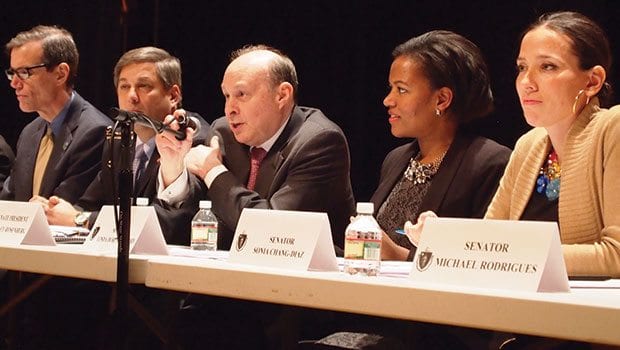
Roughly 150 people gathered at Roxbury Community College last week to voice their concerns about a wide range of topics as part of a day-long “listening tour” conducted by a group of State Senators throughout the state. The evening panel, the last of several held that day, boasted a panel of 14 Senators and attracted an audience from neighborhoods across Metro Boston, including many affiliated with various advocacy groups and associations hoping to put their issues on legislators’ radars.
Senate Minority Leader Bruce Tarr billed the evening as a rare time when the audience would have “half of the Senate standing in front of you saying absolutely nothing,” giving constituents the opportunity to speak on the issues of greatest concern to them.
Although the listening tour was described as the brainchild of Senate President Stan Rosenberg, the RCC event was co-moderated by Senators Sonia Chang-Diaz, who represents the district containing the college, and Linda Dorcena Forry. Prior to the panel, attendees had signed up under lists that were split according to topic.
The Senators allowed ten minutes each for the three most popular topics – housing, education and transportation – and four minutes for the remaining topics, with each constituent allotted two minutes of speaking time.
Audience members raised a wide range of concerns throughout the evening, maintaining a subdued tone. Most people issued earnest pleas for their cause rather than direct reproaches of the elected officials before them.
Range of concerns
Those who addressed housing issues focused almost exclusively on the issue of affordable housing. Zakiya Alake of Uphams Corner shared her experience facing predatory lending, bankruptcy and foreclosure that she said cost her the home where she once lived with her sons, grandchildren and several other relatives.
Parents of school-age children used the opportunity to decry what they saw as the sub-par state of the BPS, all of them pointing to charter schools as a solution that should be utilized more. Some parents who had children at charter schools begged the Senators to lift the state cap on their number. Mattapan resident Stacey Marlow, who has one child in a charter school and another in a traditional BPS school, said she did not see the two types of schools as necessarily at odds with each other.
“I would encourage you not only to lift the cap [on charters], but also to overhaul the Boston school system, so parents who feel like they don’t want to go to [charter or private schools] can have faith,” she told the Senators.
Another popular topic was criminal justice reform. A number of people, many affiliated with advocacy groups including the Massachusetts Communities Action Network and the Massachusetts Bail Fund, spoke about changes they felt were needed to fix a criminal justice system characterized by “mass incarceration” that targeted the poor and people of color.
Some advocated changes to a bail bonds system that they described as creating a “two-tier” divide between those who can afford pre-trial bail and those who cannot. Even a bail as low as $100, they said, could create significant employment and family interruptions for low-income people who wait in confinement for their day in court.
While attendees did raise three hot-button issues that have recently grabbed recent — the city’s Olympic bid, the woeful state of the MBTA following Boston’s snow troubles, and the recently federally-approved natural gas pipeline that would cross through West Roxbury — these topics did not dominate the conversation.
A few people arrived carrying signs from the organization No Boston Olympics, with two going before the mic to voice their concerns. One woman addressed the argument used by Olympic backers that organizing the games will help Boston to facilitate greater public and private investment in much-needed transportation and infrastructure projects.
“We don’t need [the Olympics] to do these things,” she said. “You’re our legislators and we want you to do these things for us.”
Transportation woes
Concerns about funding for the beleaguered MBTA were but one part of a cluster of questions on transportation. Others raised included support for a so-called “Safe Driving Bill” to ensure that undocumented immigrants could receive drivers’ licenses and an impassioned plea from a number of taxi drivers, many of them members of the Boston Taxi Driver’s Association, calling for a more equal playing field to compete against ride-sharing services such as Uber and Lyft.
When one man raised the issue of MBTA financing, Senator Forry broke the panel’s self-imposed silence to tell him they were very aware of the concerns, and had spent about thirty minutes on that topic alone at some of the earlier Senator panels held that day.
A few attendees also raised concerns about the proposed natural gas pipeline that would pass through West Roxbury. One man described the issue as a matter of funding priorities, saying, “a high school in Mattapan is a better investment than a pipeline in West Roxbury or anywhere else.”
Throughout the evening, the Senators mostly sat in silence and listened. A few could be seen whispering to each other from time to time, and it appeared that some jotted down notes. Chang-Diaz also tweeted several quotes and main points from audience members. The panel last for roughly two hours, until every person in the audience who had signed up to speak had their chance.






